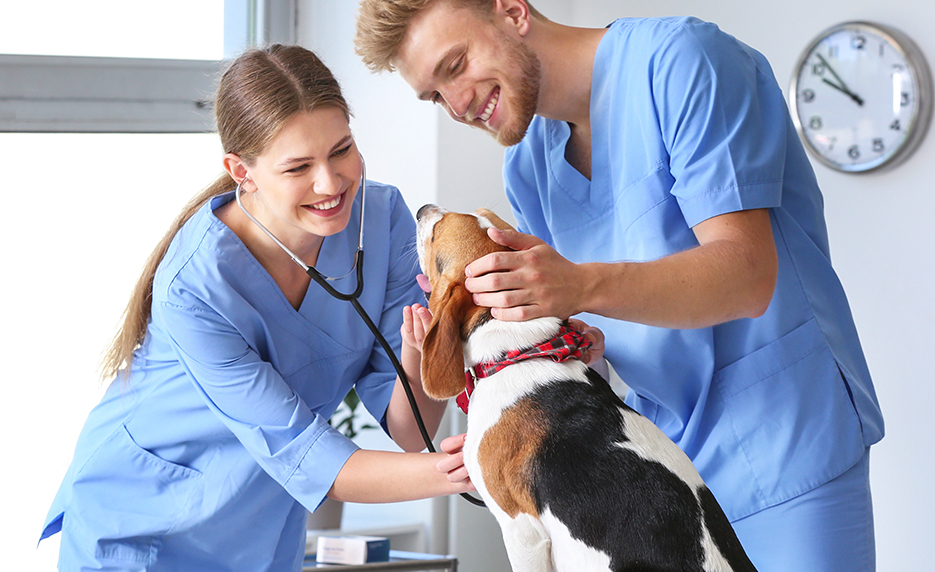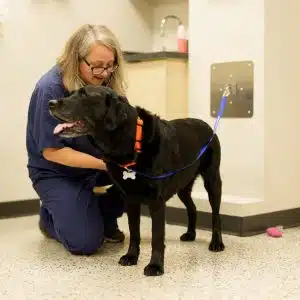Recovery tips after Pet Cancer Surgery
Wiki Article
Comprehensive Guide to the Services Used by a Vet Oncologist
Vet oncology includes a wide range of services focused on treating and identifying cancer cells in animals. Veterinary Oncologist. Oncologists utilize advanced analysis techniques and provide numerous treatment alternatives tailored per animal's demands. They also focus on supportive care and provide important resources for pet dog owners. Understanding these solutions is crucial for making notified decisions. What specific facets of vet oncology can significantly influence an animal's treatment trip?Comprehending Veterinary Oncology
Vet oncology is a customized field concentrated on treating and detecting cancer cells in animals. This technique incorporates a wide variety of approaches, from medical treatments such as chemotherapy and immunotherapy to medical treatments aimed at removing tumors. Veterinary oncologists are trained to identify the unique manifestations of cancer in different species, enabling them to tailor therapy strategies to specific people.In addition to conventional therapies, vet oncology stresses supportive care, which plays a vital function in improving the lifestyle for damaged pets. This includes pain administration, dietary support, and palliative care choices. Cooperation with pet dog proprietors is vital, as they are integral to decision-making concerning their pet dogs' therapy paths. As study advancements, veterinary oncology proceeds to advance, providing new hope and enhanced end results for pet dogs identified with cancer cells. On the whole, this area is basic for resolving the complexities of cancer in buddy pets.
Advanced Diagnostic Techniques
Advanced diagnostic methods play a crucial role in vet oncology, supplying crucial insights right into the existence and extent of cancer cells in pets. Imaging modalities such as ultrasound, CT scans, and MRI are frequently used to picture tumors and assess their features. In addition, biopsy treatments are essential for acquiring cells samples, enabling for definitive diagnosis and customized therapy strategies.Imaging Modalities Utilized
Imaging methods play a necessary duty in the medical diagnosis and administration of cancer in animals. Vet oncologists make use of various advanced imaging techniques to examine lump size, presence, and metastasis. Radiography, or X-rays, provides a preliminary sight of bone and upper body problems, while ultrasound supplies real-time imaging of soft cells, permitting detailed assessment of inner organs. Computed tomography (CT) improves visualization of complex anatomical frameworks and allows 3D restorations, assisting in precise lump localization. Magnetic vibration imaging (MRI) is indispensable for soft cells differentiation, particularly in mind growths. Additionally, nuclear medication methods such as positron discharge tomography (FAMILY PET) help identify metabolic activity within lumps. Collectively, these modalities improve analysis precision, guiding reliable therapy techniques for oncological clients.Biopsy Treatments Explained
Following the first evaluation with imaging techniques, getting a definitive diagnosis often requires tissue sampling via biopsy treatments. Veterinary oncologists utilize various biopsy techniques based upon the growth's area and characteristics. Fine needle ambition (FNA) is a minimally intrusive technique that extracts cells for cytological evaluation, suitable for surface masses. Core needle biopsies supply larger tissue samples and serve for much deeper tumors, enabling histopathological analysis. Surgical biopsies involve excising a portion or the entire tumor, helping with detailed assessment. These treatments not just validate the presence of cancer however also aid identify its type and quality, guiding therapy decisions. Each biopsy approach is chosen thoroughly to stabilize diagnostic precision with client safety and security and comfort.Treatment Options for Cancer in Family pets
When a pet is diagnosed with cancer, a range of therapy options appear to help boost and handle the condition lifestyle. Veterinary oncologists usually suggest a multidisciplinary method tailored to the specific pet's needs, which may consist of surgical treatment, radiation therapy, immunotherapy, or alternative therapies.Surgical treatment is typically utilized to remove tumors and afflicted cells, potentially leading to full remission in many cases. Radiation treatment intends to target and damage cancer cells, lowering growth size and minimizing signs and symptoms - Veterinary Oncologist. Immunotherapy utilizes the pet dog's immune system to combat cancer cells much more properly, while alternative treatments might consist of acupuncture or natural supplements to support general wellness
Each therapy option brings its own advantages and threats, and vet oncologists function carefully with pet owners to make a complete plan that straightens with the animal's details medical diagnosis and the proprietor's dreams. The best objective is to improve the animal's convenience and lifestyle throughout their cancer cells trip.
Chemotherapy for Animals
Radiation treatment is a typical treatment alternative for pets detected with cancer and is frequently utilized in combination with various other treatments described by vet oncologists. This treatment entails the management of specific medications designed to destroy and target cancer cells, therefore decreasing growth dimension and avoiding the spread of the illness. Veterinary oncologists tailor radiation treatment protocols based on the sort of cancer cells, the pet's general wellness, and the wanted therapy outcome.Negative effects can take place, as these medications may additionally influence healthy and balanced cells. Common responses include nausea or vomiting, vomiting, and short-lived changes in hunger - Veterinary Oncology Services. Vet oncologists are outfitted to take care of these adverse effects efficiently, ensuring the animal's comfort throughout the treatment process. Routine surveillance via blood examinations and follow-up consultations is important to assess the family pet's feedback to chemotherapy and make necessary changes. Eventually, chemotherapy can give substantial advantages, boosting the lifestyle for pet dogs encountering cancer cells medical diagnoses

Radiation Treatment in Veterinary Medicine
Radiation therapy functions as an efficient treatment option for pet dogs diagnosed with local growths, providing a targeted method to cancer cells administration. This method utilizes high-energy radiation to harm the DNA of cancer cells, preventing their capability to proliferate. It is especially useful for lumps that are not responsive to medical elimination or for instances where surgical treatment may not be practical because of the tumor's area.Vet oncologists tailor radiation procedures based upon lump dimension, location, and kind, along with the family pet's overall health. Treatment can be supplied via outside beam of light radiation or brachytherapy, each with distinct benefits. Generally, several sessions are needed to make best use of efficiency while reducing side impacts.
Family pets may experience temporary responses such as skin inflammation, the general objective is to reduce tumors and alleviate signs and symptoms, inevitably boosting the pet dog's prognosis and top quality of life. Accordingly, radiation therapy plays a necessary role in extensive cancer cells care.
Palliative Care and High Quality of Life
Palliative treatment in vet oncology focuses on boosting the high quality of life for pets encountering incurable ailments, guaranteeing comfort and self-respect in their last days. This specific method prioritizes discomfort management, sign control, and psychological support. Veterinary oncologists evaluate each pet's specific needs, tailoring treatments to reduce pain and enhance overall well-being.Methods might include carrying out medicines for discomfort alleviation, handling queasiness, and addressing various other upsetting signs and symptoms. Furthermore, nutritional assistance is often supplied to keep toughness and enhance cravings. The emotional facet of palliative treatment is equally important; developing a calm setting helps in reducing stress and anxiety for both pet and proprietor.
Inevitably, the objective of palliative care is to allow pet dogs to enjoy their remaining time with as much joy and self-respect as possible. By focusing on comfort and lifestyle, veterinary oncologists play a necessary function in ensuring that animals and their family members browse this difficult journey with compassion and understanding.
Support for Family Pet Owners Throughout Treatment

Psychological Support for Proprietors
Charting the emotional landscape throughout an animal's cancer therapy can be an overwhelming experience for owners. The unpredictability bordering medical diagnosis and prognosis can lead to feelings of helplessness, sadness, and anxiety. Veterinary oncologists acknowledge the value of psychological support and frequently give guidance to help owners navigate this difficult journey. Interaction is essential; reviewing therapy choices and potential end results can relieve some fears. In addition, offering reassurance that psychological reactions are valid fosters a helpful setting. Many oncology facilities may also suggest support system or counseling solutions customized for family pet proprietors, assisting in common experiences. Urging owners to prioritize self-care throughout this time around is essential, as their emotional health directly influences their family pet's comfort and overall therapy experience.
Resources and Educational Products
Steering via the complexities of a pet's cancer treatment can be daunting for owners, making accessibility to instructional products and reputable resources vital. Veterinary oncologists typically give a selection of handouts, pamphlets, and online materials that discuss therapy options, prospective negative effects, and care approaches. These resources aid empower and demystify the process pet owners to make informed decisions. Additionally, numerous oncology facilities supply accessibility to support teams and discussion forums where proprietors can link with others encountering comparable challenges, fostering a feeling of area. Educational webinars and seminars carried out by veterinary specialists better enhance understanding, making certain that owners are well-equipped to navigate their family pet's trip with cancer therapy with confidence and understanding.Frequently Asked Inquiries
Just How Can I Prepare My Family Pet for a Vet Oncology Check Out?
Preparing a pet for a veterinary oncology see entails event clinical records, keeping in mind symptoms, and guaranteeing the pet dog is comfortable. A tranquil temperament and acquainted items can assist alleviate anxiousness during the consultation.What Are the Indications My Pet Dog May Have Cancer?
Signs that a family pet might have cancer consist of unusual weight loss, persistent vomiting or diarrhea, uncommon swellings or swellings, lethargy, changes in cravings, trouble breathing, and alterations in behavior. Prompt veterinary attention is crucial.Just How Can I Support My Family Pet Mentally Throughout Treatment?
Supporting a pet emotionally throughout treatment involves supplying convenience, preserving routines, offering gentle Pet Cancer Surgery love, and making certain a calm setting. Engaging in silent play and routine companionship assists reduce anxiety and fosters a complacency.Exist Alternative Treatments for Pets With Cancer?
Alternate treatments for pet dogs with cancer include acupuncture, herbal treatments, and nutritional assistance. These methods may match traditional treatments, advertising overall health. Consulting with a vet is essential for risk-free and efficient assimilation of alternative treatments.What Costs Should I Anticipate for Vet Oncology Solutions?
The anticipated expenses for veterinary oncology services can vary significantly, frequently affected by diagnostics, treatments, and ongoing treatment. Pet proprietors need to prepare for expenses ranging from assessments to specialized therapies, mirroring the intricacy of cancer management.Cooperation with animal proprietors is crucial, as they are integral to decision-making concerning their pet dogs' treatment courses. Each treatment option brings its own benefits and risks, and veterinary oncologists function very closely with animal proprietors to design a comprehensive strategy that straightens with the animal's certain medical diagnosis and the owner's wishes. Animals might experience short-term reactions such as skin irritability, the general objective is to diminish growths and ease symptoms, ultimately enhancing the family pet's prognosis and high quality of life. Assistance for family pet proprietors throughout treatment is important in guiding with the psychological obstacles linked with a family pet's cancer medical diagnosis. Preparing a pet dog for a veterinary oncology go to includes event medical records, keeping in mind signs, and making certain the family pet is comfy.
Report this wiki page